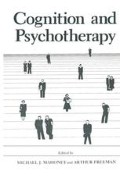Abstract
“Chaos prevails,” declared Colby when prefacing his review of psychotherapy in the mid-1960s (Colby, 1964). By then, even many Freudians were questioning the effectiveness of psychoanalysis. And chaos still prevails, since by now the number of psychotherapies seems roughly to equal the number of its practitioners. For a cognitive therapist, however, the apparent chaos may simply mean that different techniques change the faulty cognitions that produce psychological disorders. This violates, of course, our expectation that there should be one best way to do anything—treat a medical disorder, learn how to read, or build a home. The single best solution stereotype is valid, if at all, only for limited and highly specified activities. Particularly in the psychological realm there are usually many different ways of solving problems. If psychotherapy is the modification or elimination of faulty conceptions, there is little reason for surprise that different treatment procedures produce similar results. There is even research support for the latter contention, as Smith and Glass (1977) have shown.
Access this chapter
Tax calculation will be finalised at checkout
Purchases are for personal use only
Preview
Unable to display preview. Download preview PDF.
References
Anderson, C. M., Self-image therapy. In R. J. Corsini (Ed.), Handbook of innovative psychotherapies. New York: Wiley, 1981.
Ansbacher, H. L., & Ansbacher, R. R., (Eds.). The individual psychology of Alfred Adler. New York: Harper & Row, 1956.
Arnold, M., (Ed.). Feelings and emotions: The Loyola Symposium. New York: Academic Press, 1970.
Bandura, A., Principles of behavior modification. New York: Holt, Rinehart & Winston, 1969.
Beck, A. T., Cognitive therapy and the emotional disorders. New York: International Universities Press, 1976.
Beck, A. T., Rush, A. J., Shaw, B. F., & Emery, G., Cognitive therapy of depression. New York: Guilford, 1979.
Bergin, A. E., & Strupp, H. H., Changing frontiers in the science of psychotherapy. Chicago: Aldine-Atherton, 1972.
Colby, K. M., Psychotherapeutic processes. In P. R. Farnsworth (Ed.), Annual review of psychology. Palo Alto: Annual Reviews, 1964.
Combs, A. W., & Snygg, D., Individual behavior: A perceptual approach to behavior (rev. ed.). New York: Harper, 1959.
Ellis, A., Reason and emotion in psychotherapy. New York: Lyle Stuart,1962.
Goldfried, M. R., (Ed.). Converging themes in psychotherapy: Trends in psychodynamic, humanistic, and behavioral practice. New York: Springer, 1982.
Kohut, H., The analysis of the self New York: International Universities Press, 1971.
Lazarus, R. S., Thoughts on the relation between emotion and cognition. American Psychologist, 1982, 37, 1019–1024.
Leeper, R. S., The motivational and perceptual properties of emotions as indicating their fundamental character and role. In M. Arnold (Ed.), Feelings and emotions: The Loyola Symposium. New York: Academic Press, 1970.
Mahoney, M. J., (Ed.). Psychotherapy process: Current issues and future directions. New York: Plenum Press, 1980.
Perry, H. S., & Gawel, M. L., (Eds.). The interpersonal theory of psychiatry. New York: Norton, 1953.
Perls, F. S., Gestalt therapy verbatim. Lafayette, CA: Real People Press, 1969.
Raimy, V., Misunderstandings of the self: Cognitive psychotherapy and the misconception hypothesis. San Francisco: Jossey-Bass, 1975.
Rotter, J. B., Some implications of social learning theory for the practice of psychotherapy. In D. J. Levis (Ed.), Learning approaches to therapeutic behavior change. Chicago: Aldine-Atherton, 1970.
Smith, M. L., & Glass, G. V., Meta-analysis of psychotherapy outcome studies. American Psychologist, 1977, 32, 752–760.
Thorne, F. C., Personality: A clinical, eclectic viewpoint. Journal of Clinical Psychology, 1961, 18, 172–176.
Tomkins, S. S., The quest for primary motives: Biography and autobiography of an idea. Journal of Personality and Social Psychology, 1981, 41, 306–329.
Zajonc, R. B., Feeling and thinking: Preferences need no inferences. American Psy-chologist, 1980, 35, 151–175.
Author information
Authors and Affiliations
Editor information
Editors and Affiliations
Rights and permissions
Copyright information
© 1985 Plenum Press, New York
About this chapter
Cite this chapter
Raimy, V. (1985). Misconceptions and the Cognitive Therapies. In: Mahoney, M.J., Freeman, A. (eds) Cognition and Psychotherapy. Springer, Boston, MA. https://doi.org/10.1007/978-1-4684-7562-3_7
Download citation
DOI: https://doi.org/10.1007/978-1-4684-7562-3_7
Publisher Name: Springer, Boston, MA
Print ISBN: 978-1-4684-7564-7
Online ISBN: 978-1-4684-7562-3
eBook Packages: Springer Book Archive

